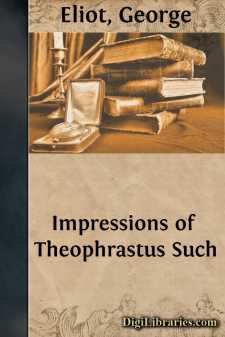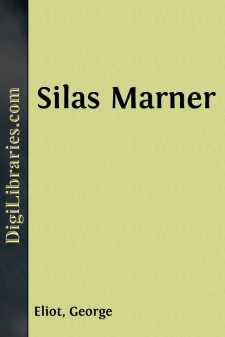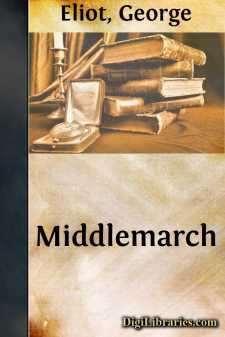Categories
- Antiques & Collectibles 13
- Architecture 36
- Art 48
- Bibles 22
- Biography & Autobiography 813
- Body, Mind & Spirit 142
- Business & Economics 28
- Children's Books 14
- Children's Fiction 11
- Computers 4
- Cooking 94
- Crafts & Hobbies 4
- Drama 346
- Education 46
- Family & Relationships 57
- Fiction 11829
- Games 19
- Gardening 17
- Health & Fitness 34
- History 1377
- House & Home 1
- Humor 147
- Juvenile Fiction 1873
- Juvenile Nonfiction 202
- Language Arts & Disciplines 88
- Law 16
- Literary Collections 686
- Literary Criticism 179
- Mathematics 13
- Medical 41
- Music 40
- Nature 179
- Non-Classifiable 1768
- Performing Arts 7
- Periodicals 1453
- Philosophy 64
- Photography 2
- Poetry 896
- Political Science 203
- Psychology 42
- Reference 154
- Religion 513
- Science 126
- Self-Help 84
- Social Science 81
- Sports & Recreation 34
- Study Aids 3
- Technology & Engineering 59
- Transportation 23
- Travel 463
- True Crime 29
The Lifted Veil
by: George Eliot
Categories:
Description:
Excerpt
CHAPTER I
The time of my end approaches. I have lately been subject to attacks of angina pectoris; and in the ordinary course of things, my physician tells me, I may fairly hope that my life will not be protracted many months. Unless, then, I am cursed with an exceptional physical constitution, as I am cursed with an exceptional mental character, I shall not much longer groan under the wearisome burthen of this earthly existence. If it were to be otherwise—if I were to live on to the age most men desire and provide for—I should for once have known whether the miseries of delusive expectation can outweigh the miseries of true provision. For I foresee when I shall die, and everything that will happen in my last moments.
Just a month from this day, on September 20, 1850, I shall be sitting in this chair, in this study, at ten o’clock at night, longing to die, weary of incessant insight and foresight, without delusions and without hope. Just as I am watching a tongue of blue flame rising in the fire, and my lamp is burning low, the horrible contraction will begin at my chest. I shall only have time to reach the bell, and pull it violently, before the sense of suffocation will come. No one will answer my bell. I know why. My two servants are lovers, and will have quarrelled. My housekeeper will have rushed out of the house in a fury, two hours before, hoping that Perry will believe she has gone to drown herself. Perry is alarmed at last, and is gone out after her. The little scullery-maid is asleep on a bench: she never answers the bell; it does not wake her. The sense of suffocation increases: my lamp goes out with a horrible stench: I make a great effort, and snatch at the bell again. I long for life, and there is no help. I thirsted for the unknown: the thirst is gone. O God, let me stay with the known, and be weary of it: I am content. Agony of pain and suffocation—and all the while the earth, the fields, the pebbly brook at the bottom of the rookery, the fresh scent after the rain, the light of the morning through my chamber-window, the warmth of the hearth after the frosty air—will darkness close over them for ever?
Darkness—darkness—no pain—nothing but darkness: but I am passing on and on through the darkness: my thought stays in the darkness, but always with a sense of moving onward . . .
Before that time comes, I wish to use my last hours of ease and strength in telling the strange story of my experience. I have never fully unbosomed myself to any human being; I have never been encouraged to trust much in the sympathy of my fellow-men. But we have all a chance of meeting with some pity, some tenderness, some charity, when we are dead: it is the living only who cannot be forgiven—the living only from whom men’s indulgence and reverence are held off, like the rain by the hard east wind. While the heart beats, bruise it—it is your only opportunity; while the eye can still turn towards you with moist, timid entreaty, freeze it with an icy unanswering gaze; while the ear, that delicate messenger to the inmost sanctuary of the soul, can still take in the tones of kindness, put it off with hard civility, or sneering compliment, or envious affectation of indifference; while the creative brain can still throb with the sense of injustice, with the yearning for brotherly recognition—make haste—oppress it with your ill-considered judgements, your trivial comparisons, your careless misrepresentations. The heart will by and by be still—“ubi saeva indignatio ulterius cor lacerare nequit”; the eye will cease to entreat; the ear will be deaf; the brain will have ceased from all wants as well as from all work. Then your charitable speeches may find vent; then you may remember and pity the toil and the struggle and the failure; then you may give due honour to the work achieved; then you may find extenuation for errors, and may consent to bury them....












